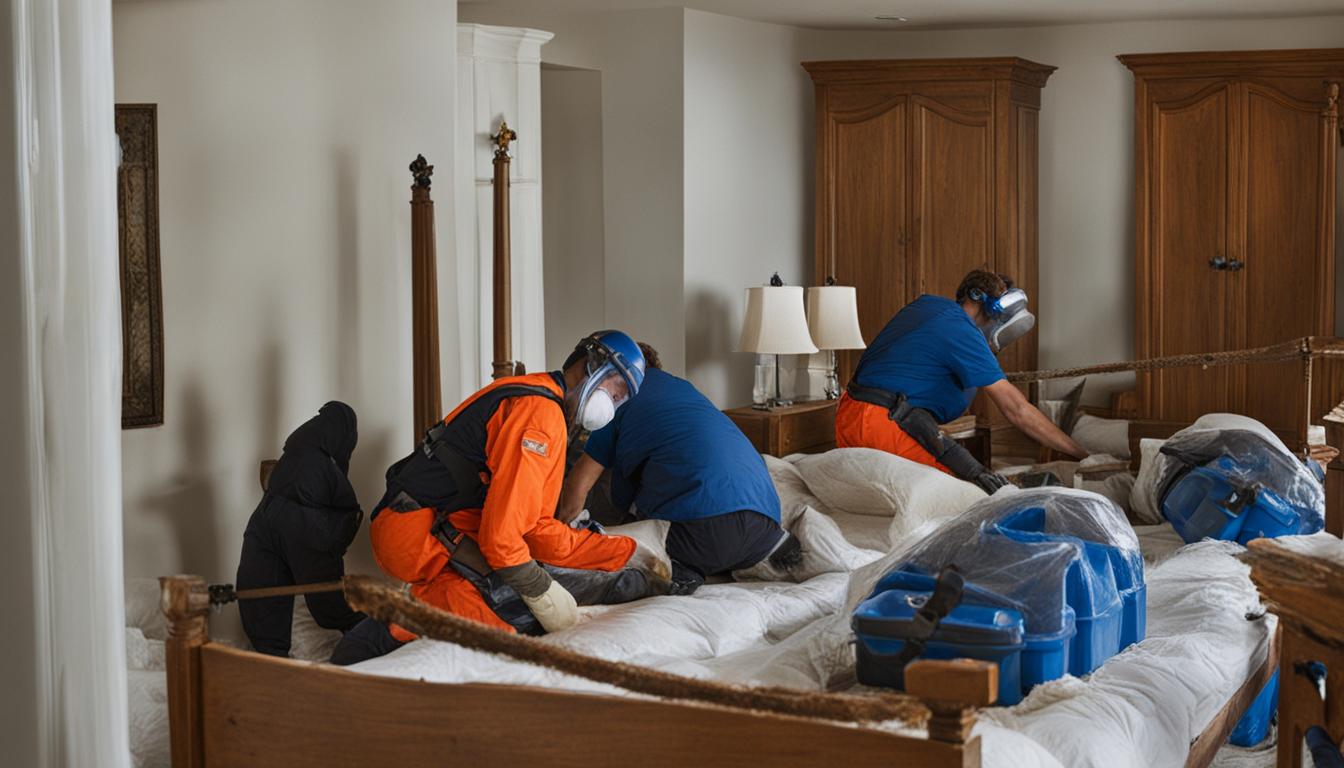As a homeowner, water damage can be a nightmare. It not only affects the aesthetics of your home but also poses a significant safety threat to you and your family. One of the most pressing concerns for homeowners dealing with water damage is whether sleeping in the house is safe.
Water damage safety is a serious issue that requires immediate attention. Even if just one room in your home is affected, the risk of injury or illness remains high.
Before deciding whether to sleep in your water-damaged house, it’s essential to understand the risks involved, both for your health and the structural integrity of the property. So, is it safe to sleep in a house with water damage? Let’s explore this question in more detail.
Key Takeaways
- Water damage poses safety risks to both your health and the structural integrity of your home.
- Sleeping in a water-damaged house can lead to health problems from mold, bacteria, and other pathogens.
- Electrical hazards and weakened structures are other major concerns when inhabiting water-damaged properties.
- It’s crucial to seek professional inspection and assistance to ensure safe habitation after water damage.
- If staying in your water-damaged house is not safe or feasible, there are temporary accommodation options you can consider.
Understanding the Risks of Water Damage
Water damage can pose serious risks to both your health and the structural integrity of your property. It is important to understand these risks so that you can take appropriate action to mitigate them.
Health Hazards: When water damage occurs, it creates the perfect environment for mold and bacteria growth. This can lead to respiratory problems, infections, and other health issues, particularly for individuals with weakened immune systems. In addition, contaminated water from floods or sewage backups can contain harmful chemicals and pathogens that may pose serious health risks.
Structural Issues: Water damage can weaken the structural integrity of your property, compromising its safety and stability. This can result in potential hazards such as collapsing ceilings or floors, electrical malfunctions, and gas leaks.
It is essential to address water damage as soon as possible to prevent these risks from worsening. In some cases, it may be necessary to seek professional assistance to properly assess and address the damage.
Health Concerns in Water-Damaged Homes
If your house has been affected by water damage, your health could be at risk. The presence of excess moisture can lead to mold growth, which can cause a range of health problems. Exposure to mold can trigger allergic reactions, including sneezing, coughing, and itchy eyes. In some cases, it can even lead to asthma attacks.
In addition, water damage can impact the air quality in your home. Damp environments are breeding grounds for bacteria, which can lead to respiratory infections and other illnesses. It’s important to take swift action to address water damage in your home and prevent the spread of harmful bacteria.
The following table outlines some of the potential health risks associated with water damage:
| Health Concerns | Description |
|---|---|
| Mold exposure | Mold can trigger allergic reactions, respiratory problems, and asthma attacks. |
| Bacterial infections | Damp environments can lead to the growth of harmful bacteria, which can cause infections. |
| Chemical exposure | Water damage can cause hazardous chemicals to leach into the air. |
| Increased humidity | Excess moisture in the air can lead to skin irritation, eye irritation, and respiratory problems. |
It’s essential to seek professional assistance when dealing with water damage in your home. Not only can they help to assess the extent of the damage, but they can also provide remediation and sanitation services to restore your home to a safe condition.
Structural Integrity of Water-Damaged Properties
Water damage can have severe impacts on the structural integrity of a property, making it unsafe for habitation. When water seeps into a building’s foundation, it can cause serious damage, leading to weakened structures and a host of safety risks.
One way water damage can affect the integrity of a property is through its electrical systems. When water comes into contact with electrical wiring, it can create hazardous conditions, increasing the risk of electrocution or fire. Furthermore, if left unchecked, water can lead to mold growth, which can further deteriorate the property’s structural integrity.
Damage to load-bearing walls, floors and ceilings can also occur. This can result in a dangerous living environment and even lead to the collapse of the property. It is crucial to seek professional assistance and inspection before inhabiting a water-damaged property to prevent such hazards from arising.
In summary, water damage compromises the structural integrity of a property, posing significant safety risks if not addressed correctly. It is crucial to act swiftly in the event of water damage and seek professional support to ensure the property is safe for habitation.
Electrical Safety Concerns in Water-Damaged Homes
When a home is affected by water damage, there are several safety concerns to consider. One of the most critical of these is the risk of electrical hazards, which may arise due to water exposure. Even if the visible cause of water damage appears to have been repaired, there could still be hidden issues with the electrical system that present a danger to those inside the property.
Some of the risks of electricity in water damage include:
- Electrical shock: When water comes into contact with electrical outlets, wiring, or appliances, it can create a potentially lethal situation. Contact with even small amounts of electrical current can cause serious injury or death.
- Fire: Water damage can cause short circuits, which may result in electrical fires that put the property and its occupants at risk.
- Compromised wiring: Water can damage the insulation around wiring, corrode electrical connections, and create an environment where faulty wiring may occur. Over time, these issues can lead to a compromised electrical system that poses a risk to the property’s occupants.
Therefore, it is crucial to have the electrical system inspected by a professional before inhabiting the water-damaged property. Attempting repairs or assessing the damage without the proper knowledge and equipment can lead to further risks and hazards.
Steps to Ensure Safe Habitation After Water Damage
When dealing with water damage, it’s essential to take specific steps to ensure safe habitation in your property. Here are some practical recommendations:
- Proper Drying and Ventilation: Ensure your property is adequately dried and ventilated to prevent mold growth and further damage. Open windows and doors, use fans and dehumidifiers, and remove any wet materials or objects.
- Mold Remediation: Mold can pose significant health risks. If you notice mold growth, seek professional remediation services immediately. It’s essential to address the root cause of the moisture that led to mold growth.
- Professional Inspection: It’s crucial to have your property inspected by a professional before inhabiting it after water damage. Professionals can detect hidden damage, structural issues, and electrical hazards that could pose a threat to you and your loved ones.
- Take Necessary Precautions: Always wear protective gear, such as gloves, masks, and goggles when dealing with water damage and its aftermath. Avoid contact with contaminated water and surfaces, and sanitize affected areas before and after cleaning.
- Stay Alert: Watch out for signs of water damage and potential hazards such as leaks, cracks, and damp areas. Regularly inspect your property to detect potential issues before they escalate and cause further damage.
By taking these steps, you can ensure safe habitation in your property after water damage. However, it’s crucial to seek professional help and advice when dealing with water damage to ensure your safety and the safety of your loved ones.
Temporary Accommodation Options During Restoration
In some cases, inhabiting a water-damaged property during restoration is simply not safe. In these circumstances, you must find temporary accommodation until your home is once again habitable. Here are some options to consider:
| Option | Pros | Cons |
|---|---|---|
| Stay with family and friends | – Usually free of charge – Familiar and comfortable surroundings – Emotional support from loved ones |
– Limited time availability – May be inconvenient distance-wise – Can strain relationships if overstaying |
| Rent a temporary dwelling | – Flexibility in location and length of stay – Opportunity to experience a new area – Privacy and space |
– Can be expensive – Additional costs for furniture, utilities, etc. – Difficult to organize in a short time frame |
| Seek assistance from relevant organizations | – May be eligible for financial aid – Professional assistance in finding temporary housing – Access to additional resources |
– Eligibility requirements may be strict – Process can be lengthy – Limited options available |
Consider which option suits your needs and budget best. It’s essential to find safe accommodation during the restoration process to mitigate any potential health and safety risks.
Conclusion
Water damage can cause significant risks and hazards to both your health and safety. It is important to take necessary precautions and prioritize your well-being when dealing with water damage in your property.
In summary, the risks associated with water damage include structural damage, electrical hazards, and health concerns like mold growth. It is not safe to sleep in a water-damaged house until it has been thoroughly inspected and assessed by a professional.
Before inhabiting a water-damaged property, it is crucial to ensure proper drying and ventilation, mold remediation, and professional inspection. In some cases, it may be necessary to consider temporary accommodation during the restoration process.
In conclusion, always prioritize safety and health when dealing with water damage. Seek professional assistance and take necessary steps to ensure safe habitation of your property.
FAQ
Can you sleep in a house with water damage?
It is not recommended to sleep in a house with water damage. There are potential health and safety risks associated with inhabiting a water-damaged property.
What are the risks of water damage?
Water damage can lead to several risks, including structural damage, health hazards, and electrical safety concerns.
What are the health concerns in water-damaged homes?
Staying in a water-damaged house can lead to health issues such as mold growth, respiratory problems, and allergies.
How does water damage affect the structural integrity of properties?
Water damage can weaken the foundations, compromise electrical systems, and cause other structural hazards that can pose a safety risk.
What are the electrical safety concerns in water-damaged homes?
Water damage can lead to electrical malfunctions and the risk of electrocution. It is crucial to have a professional assessment before inhabiting a water-damaged property.
What steps should be taken for safe habitation after water damage?
To ensure safe habitation after water damage, it is important to properly dry and ventilate the space, address mold issues, and seek professional inspection and assistance.
What temporary accommodation options are available during restoration?
If it is not safe or feasible to stay in a water-damaged house during restoration, consider options like staying with family or friends, renting a temporary dwelling, or seeking assistance from relevant organizations.









